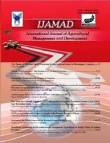Weak Separability Testing and Estimation of Selected Food Commodities Demand System in Urban Households of Iran (Case of Citrus Fruits, Cucurbits and Vegetables)
The separability of consumer desires is a necessary condition for multi-stage budgeting and collectivization is consistent of commodity where costs are allocated between edible groups using price indices and intergroup allocations are made independent of other groups. In empirical studies of demand, the concept of separation is used to correctly estimate demand function and limit the number of parameters. For this purpose, data related to price index and cost of selected commodities (citrus fruits, cucurbits, and vegetables) derived from the Central Bank over 2016 in urban households of Iran were used. The results of the separability tests support the hypothesis that consumers first allocate their income to selected commodities in three groups (citrus fruits, cucurbits, and vegetables) and then approves the income allocation action between the types of its subgroups that are grouped. Also, the results of the system estimation showed that all groups had a negative intrinsic price elasticity. In the meantime, the price elasticity of the groups of citrus fruits (orange, tangerines, and lemon), cucurbits fruits (potato, tomato, and onion) and vegetables (the leafy ones) are equal to -0.83, -0.48 and -0.91, respectively. Given the income elasticity calculated for the three commodity groups, the second commodity group (potato, tomato, and onion) is more essential than the other commodity groups, which should be considered in government policies as to agricultural production and pricing.
- حق عضویت دریافتی صرف حمایت از نشریات عضو و نگهداری، تکمیل و توسعه مگیران میشود.
- پرداخت حق اشتراک و دانلود مقالات اجازه بازنشر آن در سایر رسانههای چاپی و دیجیتال را به کاربر نمیدهد.






